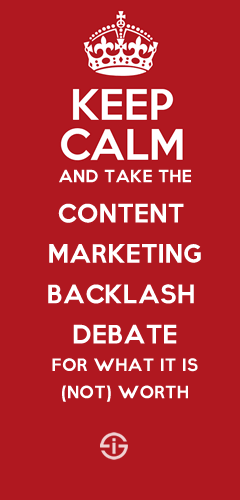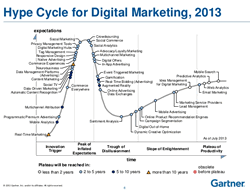The great content marketing backlash. That’s what I have been reading about these last few weeks. Or better: I noticed a never ending stream of opinions about the content marketing backlash in my different timelines. Is there a problem with content marketing and what about that content marketing backlash?
In recent conversations I noticed an increasing number of people are saying they have been doing content marketing since before the term content marketing even existed. I know that feeling and I share it. No one ever said content marketing is new, we just use it in smarter, more customer-centric, better planned and integrated ways, if we’re food and see its’ role in the overall marketing (and, yes, also sales, service, etc. perspectives). Content marketing is evolving in a fast changing digital world and fragmented media reality with a new breed of buyers and consumers. We’re human and it feels good to be able to say we’re in this business for some time now and then, no? The ego, we all have one, fortunately.
Content that sucks always will face a backlash
 Many of us have been using content marketing since a very long time for different marketing goals, combining storytelling and relevant content to generate and nurture leads, increase engagement, improve ‘thought leadership’ of the brands we work for (didn’t we use to call that ‘being top of mind’?), get relevant traffic, persuade, and so much more.
Many of us have been using content marketing since a very long time for different marketing goals, combining storytelling and relevant content to generate and nurture leads, increase engagement, improve ‘thought leadership’ of the brands we work for (didn’t we use to call that ‘being top of mind’?), get relevant traffic, persuade, and so much more.
So you’re probably right if you say that you have been ‘doing content marketing’ for years. But the content marketing backlash is driven by more than that. It’s driven by opinions of a broad range of people, all having a different background. You probably read a few of them.
I wrote one myself in fact, called ‘The Big Content Marketing Fail: How Much Content Do You Need?’ (there’s that ego again). But it’s not a case against content marketing, on the contrary. It’s more a rant about the use of content marketing without any strategy, the focus on quantity and the lack of content strategies, exactly what many content marketers see as a big problem. In that regard, check out the presentation of Jonathan Colman, inspired by another great one by doug Kessler: if your content marketing sucks, then make it unsuck. Watch both below.
Content marketing backlash or content marketing realism?
Do you remember the days where we used to complain that content was just a commodity and businesses were investing in flashy sites while ignoring that oh so crucial content that actually served customers/prospects/readers?
In that sense, I have a bit of a déjà-vu. With the so-called deluge of crappy content, the content marketing backlash opinion makers are finding more food for debates about the future of content marketing.
There is no content marketing backlash. There is just a correction going on, whereby marketers and experts start seeing that in the whole content craze many of us did what we have always known best: produce and share with volume, brand awareness reach and acquisition as key goals. Broadcasting and shouting instead of listening. There is a correction going on whereby bad content marketing approaches start getting called out and we are kindly asked to get real again and focus on some essential elements, starting indeed with listening before producing. On top of a correction, there’s also an evolution going on. That’s what happens all the time, right? Change.
What many start seeing is that content marketing requires you to:
- Have a content strategy and a content marketing strategy.
- Look at the best ways to match your unique brand message, your promise, the different touchpoints of your target groups, the channels they use, etc.
- Make sure that you’re not only there with good content stories in acquisition but also in the different steps before buying decisions are made.
- Have a holistic and integrated approach whereby content marketing is part of a broader strategy.
- Focus on your goals and target groups, as well as your strategies and processes, before even thinking content production.
- Work with content marketing personas or other ways to at least define audiences.
Carry on and focus on content marketing strategies that work
Sure, content marketing is a buzzword, in the strictest sense: there is a lot of buzz and hype about it. Content marketing is obviously hyped and sometimes over-hyped. So much we even need to talk about the content marketing backlash. It’s also in Gartner’s hype cycle for digital marketing. Email marketing was a hype once too, so what? It’s not about the term but about what lies behind it.

The fact that content marketing is hyped, doesn’t change anything to the value it offers, if done well. So, to all those people that say they’ve been doing content marketing for years and with success I would simply say: carry on and ignore the noise as much as you can. Focus on your own strengths, those of your brand and most of all the stories and content that enable you to connect with target groups in a mutually relevant way.
I would like to refer to a last blog post I wrote relatively recently. Content marketing is an umbrella term and some people seem to have a problem with that. However, why not simply look at what’s under that umbrella. Even email marketing is an umbrella term with a common denominator: the use of email. But can you honestly compare all different forms of marketing whereby email is used? Don’t think so. There’s a huge difference between a weekly newsletter, an automated ‘daily deal’ mail and a confirmation mail after we ordered something at Amazon, to give just some examples. But we call all these practices email marketing. And then there is that other umbrella term: social media marketing, covering even more realities.
The term content marketing is hot, so what? Some people don’t like it. However, what truly matters is what you do in practice. Period.
Why we speak about a content marketing backlash
In the last post I just mentioned (the umbrellas), I try to explain another reason why there is so much discussion about a content marketing backlash. And, according to me, it’s mainly about navel gazers and silos. There’s a bunch of different people who use the term content marketing and effectively use content for marketing purposes.
So, what seems to be the cause of that so-called content marketing backlash? Well, there are many factors that directly or indirectly contribute to it:
- The success of the term content marketing and the different definitions and descriptions, leading to a jungle of opinions and tips that vary according to the background of who writes them (see above).
- The fact that people start realizing it’s not “new”. So what? Why should something that perfectly works when properly done be new to begin with?
- The fact that the focus on zealous content production instead of strategic content production has led to more crappy content as many forget that it’s all about the different segments/personas and how we connect with them, “nurture” them and drive them to action in a relevant way. As long as your customers, prospects, readers, etc. have questions there is always content to produce. And guess what: people will always have questions, so answer them using the “narrative” and the unique differentiator of your brand in a cross-channel and consistent way.
- Finally, the fact that everyone uses the term nowadays and often from a very narrow perspective.
Am I missing anything? Do let me know!
Just make it work
No one has to love the term content marketing. In fact, you can even go out there and rally against it. Some people don’t like the word content either.
Personally I have a problem with other words but I don’t need to start a self-help group to ventilate my frustration about them. We can write about it and that’s cool, blogging and social media, you know. But as long as you use content for the right reasons, why not let the content marketing backlash debate for what it is: nothing more than opinions – like mine – that you can think about or not. And guess what: no one will ever fire you if you use content marketing without ever using the term but with success.
So, feel free to add to the debate or to focus on making sure that your content strategy and content marketing strategy – or whatever you want to call it – is the best you possibly can have for your goals and your audiences.
As perfection never exists and continuous optimization is a matter of everything you do as a marketer, there still is a long way to go. Furthermore, the world changes fast, very fast. And there always will be room to innovate and/or do better, even if tomorrow we all start talking about contextual marketing, agile marketing, fusion marketing and whatnot. WDYT?

